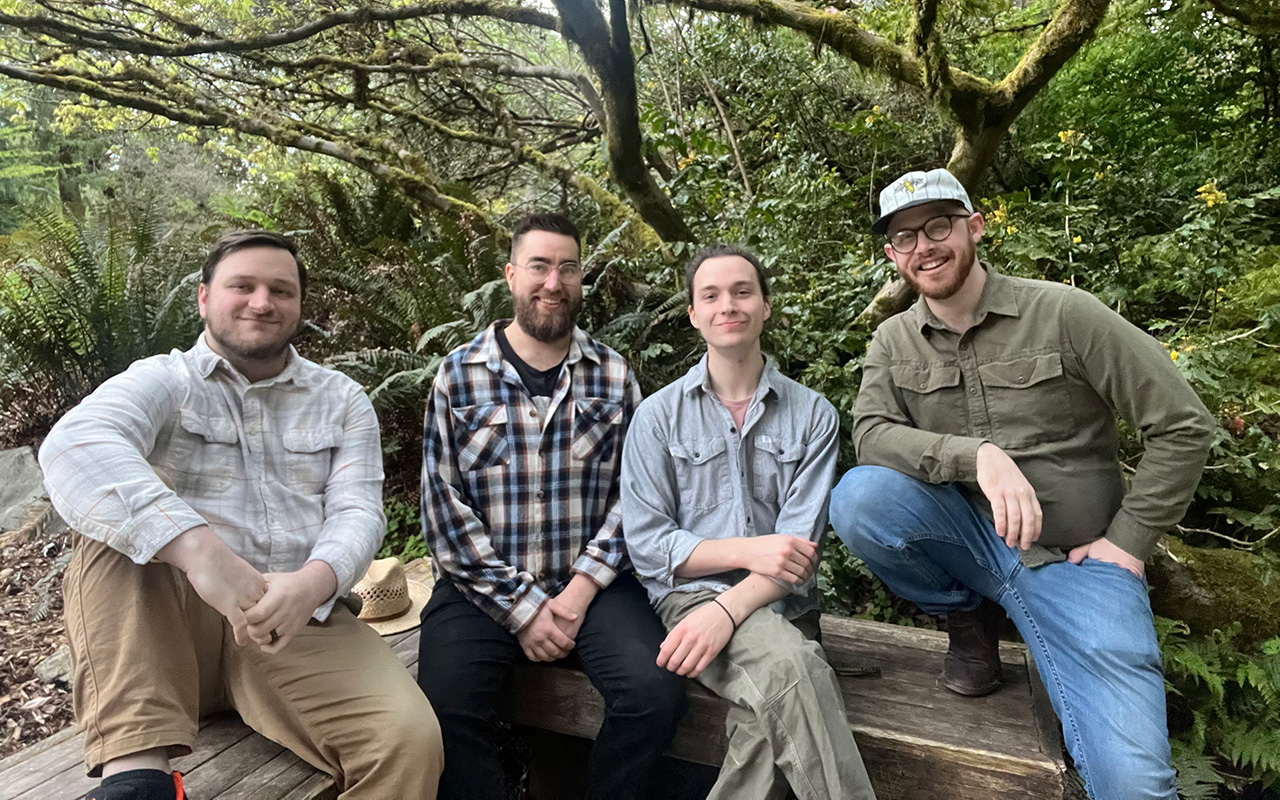
Type 85 photo courtesy of the artists. (L-R): Matt Dun, Sam Clewans, Jon Butler, and Riley Wilkins. Photo Courtesy of Artists
“Fusion is kind of a blanket word for what we’re doing,” says bassist Matt Dunn, settling in for evening practice in drummer Sam Clewans’s Madison Valley basement. “But we’re open for feedback. If people listen and think, oh, it sounds like so and so, do let us know.”
Dunn, 24, along with Clewans, 25, guitarist Riley Wilkins, 27, and pianist Jon Butler, 23, will spend a chunk of May recording their debut album as Type 85. Assembled on a Sunday evening to flush out and rehearse their new LP’s seven songs, they give off an impression of evolving composers cutting their teeth, searching for a means to escape the box that occasionally confines artists working under the nebulous umbrella of “jazz.”
Dunn, Clewans, and Butler are recent graduates of the Cornish College of the Arts Music Department. Wilkins graduated from the University of Oregon School of Music. Despite some institutional setbacks – remote pandemic learning, Chuck Deardorf’s tragic passing, Jovino Santos Neto’s departure – all four speak highly of their educations. Clewans calls Cornish “a great place to focus on what you personally want to do, as opposed to something regimented.” And Wilkins heaps praise on Oregon professor Steve Owen, saying he influenced his learning like “Chuck D” did his bandmates.
The band’s kernel formed when Clewans recruited Dunn and Butler to feature in his junior year recital. When the rhythm section stayed together for Dunn’s senior recital, the chemistry began to click. Clewans flushed out the quartet after meeting guitarist Wilkins at 4/4 School of Music on the Eastside, where they both taught lessons.
In trio permutations, occasionally switching instruments, the bandmates have honed their chops gigging jazz standards at local bars and restaurants. They see Type 85 as a vehicle for original tunes, often idiosyncratic ones. The group prides itself on flexibility and musical open-mindedness.
“Having a variety of composers is important to us,” says Butler. “It makes us better. We don’t have one centralized person who’s running the show and creating a sound. It’s nice to work in an egalitarian way where no one’s overtaxed.” He adds, “We’re all very gentlemanly to each other.”
Dunn agrees, saying, “We all have a bit of a different language with arrangements.”
Asked about their jazz inspirations, the heterogeneous nature of this quartet comes into focus. Dunn avows his love of classic, Chick Corea-era fusion. Butler names Robert Glasper as “his guy.” Clewans studies the rhythms of African percussionist Brice Wassy. Wilkins, last to answer, thinks for a while and says, “Bob Brookmeyer. And maybe, like, Devo.”
In democratic fashion, the band will split their new 7-song LP along egalitarian lines, with each member contributing two numbers except for Dunn, who has one. The band says they’re more interested in through compositions than jam tunes. The album is set to be cut in Clewans’s basement, the back of which has been transformed into a walled-off recording studio.
Asked for the album title, the bandmates don sheepish looks. Wilkins laughs and explains that finding a band name was hard enough. “I legitimately almost killed Sam,” he says with a joking grin. “It was a four-hour conversation on someone’s roof. The three of us would agree on a name, and Sam would be like, that’s not it. And then—” Wilkins turns to Clewans “—respectfully, you would say the worst band name in the world.”
Thwarted atop said roof, the band tried a “March Madness-style bracket,” submitting multiple entries in an elimination tournament. Still nothing. Wilkins finally stumbled across the Type 85 moniker while working at a bakery – he saw the name on a sack of bread flour and it stuck.
The Type 85 members say they’re making slow, if steady, inroads around the Seattle music community. Clewans calls it a much closer-knit body than where he grew up in the Bay Area. “You see the same faces over and over again,” he says of the Emerald City jazz scene. “Which is a pro and a con.”
His bandmates note that while the scene at first felt cliquey, folks are almost always personable when approached. They cite local jams as a strongpoint.
“There’s really great musicians here that you can sit down with, talk with, play with,” says Wilkins. “That’s the reason I live in Seattle. You know, I could be living in some middle of nowhere place in Texas or something. It would be a lot cheaper.”